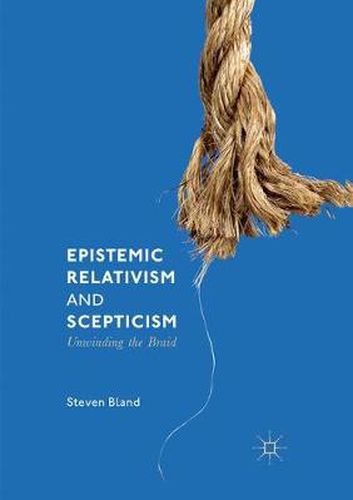Readings Newsletter
Become a Readings Member to make your shopping experience even easier.
Sign in or sign up for free!
You’re not far away from qualifying for FREE standard shipping within Australia
You’ve qualified for FREE standard shipping within Australia
The cart is loading…






This title is printed to order. This book may have been self-published. If so, we cannot guarantee the quality of the content. In the main most books will have gone through the editing process however some may not. We therefore suggest that you be aware of this before ordering this book. If in doubt check either the author or publisher’s details as we are unable to accept any returns unless they are faulty. Please contact us if you have any questions.
This book confronts the threats of epistemic relativism and Pyrrhonian scepticism to analytic philosophy. Epistemic relativists reject absolute notions of knowledge and justification, while sceptics claim that knowledge and justification of any kind are unattainable. If either of these views is correct, then there can be no objective basis for thinking that one set of methods does a better job of delivering accurate information than any other set of methods. Philosophers have generally sought to resist these threats by responding to the argument that seems to motivate both positions: the Agrippan trilemma. Steven Bland argues that this is a mistaken strategy. He surveys the most influential responses to the Agrippan trilemma, and shows that none of them succeeds in undermining epistemic relativism. Bland also offers a new, dialectical strategy of challenging epistemic relativism by uncovering how epistemic methods depend on one another for their applications. By means of this novel analysis, the book concludes that there are principled reasons to prefer naturalistic to non-naturalistic methods, even if these reasons do little to ease the threat of scepticism.
$9.00 standard shipping within Australia
FREE standard shipping within Australia for orders over $100.00
Express & International shipping calculated at checkout
This title is printed to order. This book may have been self-published. If so, we cannot guarantee the quality of the content. In the main most books will have gone through the editing process however some may not. We therefore suggest that you be aware of this before ordering this book. If in doubt check either the author or publisher’s details as we are unable to accept any returns unless they are faulty. Please contact us if you have any questions.
This book confronts the threats of epistemic relativism and Pyrrhonian scepticism to analytic philosophy. Epistemic relativists reject absolute notions of knowledge and justification, while sceptics claim that knowledge and justification of any kind are unattainable. If either of these views is correct, then there can be no objective basis for thinking that one set of methods does a better job of delivering accurate information than any other set of methods. Philosophers have generally sought to resist these threats by responding to the argument that seems to motivate both positions: the Agrippan trilemma. Steven Bland argues that this is a mistaken strategy. He surveys the most influential responses to the Agrippan trilemma, and shows that none of them succeeds in undermining epistemic relativism. Bland also offers a new, dialectical strategy of challenging epistemic relativism by uncovering how epistemic methods depend on one another for their applications. By means of this novel analysis, the book concludes that there are principled reasons to prefer naturalistic to non-naturalistic methods, even if these reasons do little to ease the threat of scepticism.